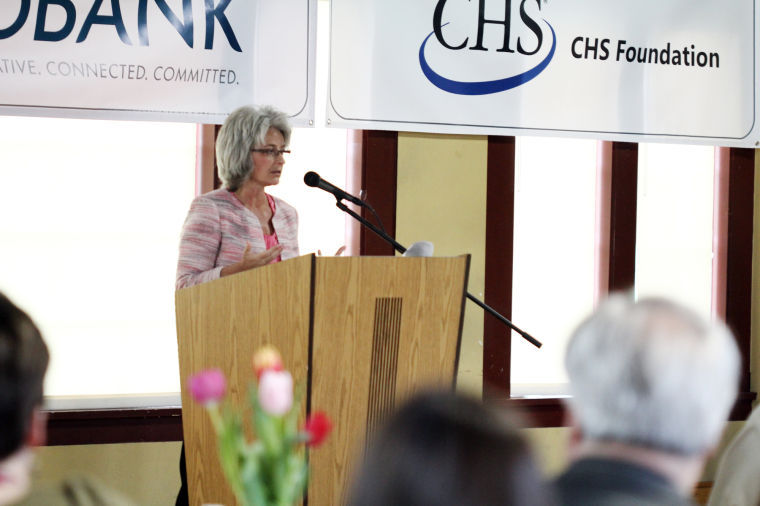Inspiring hope and securing experience
Kim Kidwell speaks during a news conference for the new CAHNRS building at Ensminger Pavilion, Friday, March 28.
March 31, 2014
The College of Agriculture, Human, and Natural Resource Sciences (CAHNRS) announced a plan to build a center to provide students with supplemental education to flourish in their college career and beyond.
Faculty, staff and industries employees attended the news conference for the new building, called the Center for Transformational Learning and Leadership (CTLL) at 9 a.m. Friday, March 28 in the Ensminger Pavilion.
The center will offer students capstone courses, internships, leadership training, mentoring, undergraduate research, and tutoring, said the executive associate dean of academics programs and program director of CTLL.
“It is inspiring hope and vision for where you can go next,” said Executive Associate Dean Kim Kidwell.
CAHNRS is currently fundraising for programming, and hopes to raise $5 million to build the center and provide faculty and staff training, said Melissa Bean, the associate director of development of CTLL.
Bean said in two years she hopes to collect all seed money and announce the building’s location.
The center’s purpose is to build skills beyond the classroom and connect students to industries and leaders and prepare them for life after WSU, said Jessica Munson, the program coordinator of the CTLL.
“Our main focus is to ease the transition into their career and be job ready day one,” Munson said.
Students who meet and learn from industry partners have an advantage in interviews with future employers, Bean said.
“(Industry leaders) want to be in contact with the next leaders in their discipline and they want to be involved in shaping and supporting them,” Kidwell said.
The center will allow students to create a diverse portfolio and open up pathways for students to acquire experience throughout their college careers, Kidwell said.
One way students can achieve this is through immersion-based international experience relevant to their academics, Kidwell said.
The motivation for the program was to create a funding mechanism to cost share with students so they can have these experiences, she said. The CTLL has a scholarship frame to provide support for international activities by paying for at least 50 percent of the trip cost.
“We’re interested in developing these immersion-based hands on opportunities for students to actually go in a country and really get mucky,” Kidwell said.
The CTLL will generate funds to support the center through the CAHNRS National Board of Advisors, which represents 80 individual industry leaders across all disciplines in CAHNRS, Bean said.
Kidwell said she hopes to increase funds from additional sponsors to build the CTLL.
“As attention, outcome and interest generate, we really do hope to fundraise for a physical structure to house the CTLL so it becomes kind of the heartbeat of the organization,” Kidwell said.
Close communication industries will create equal growth for students, the university industries and the world, Kidwell said.
“They’re enrolled, they’re engaged, they’re giving input direction in a meaningful way, so that whatever we create is what we collectively dreamed about,” Kidwell said of industry partners.
CHS Inc. donated $250,000 to CTLL, said William J. Nelson, vice president of CHS.
CoBank donated $100,000 to CTLL, said Chuck Olsen, the lead relationship manager of CoBank.
Kidwell said CoBank and CHS’s interest in the CTLL will inspire other industries to become involved with the center’s mission.
“We’re hoping this creates a firestorm of willingness like that in the industry,” Kidwell said.





















